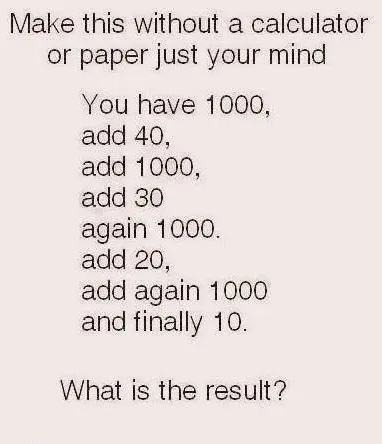I’m trying to solve the puzzle with 1000 + 40 + 1000 + 30 + 1000 + 20 + 1000 + 10, aiming for 4100. It’s interesting to see that the common error typically results in 5000.

Calculating the sum
Starting with 1000, I add 40, then 1000, followed by 30, another 1000, 20, another 1000, and finally 10, resulting in a total of 4100.
Answer: 4100
Explanation (No Calculator, No Paper, Just Your Mind)
- Start with 1000
- Keep it in your head: 1000.
- Add 40
- 1000 + 40 = 1040.
- Add another 1000
- 1040 + 1000 = 2040.
- Add 30
- 2040 + 30 = 2070.
- Add another 1000
- 2070 + 1000 = 3070.
- Add 20
- 3070 + 20 = 3090.
- Add another 1000
- 3090 + 1000 = 4090.
- Finally, add 10
- 4090 + 10 = 4100.
So, the final total is 4100.
Why People Often Say 5000
A lot of people make a quick guess and say 5000 instead of 4100. The main reason is that we see several “1000” additions and jump to a higher total without carefully adding the smaller numbers. Our brain often does something like:
- 1000 + 1000 + 1000 + 1000 = 4000,
- then it rushes through the extra numbers (40 + 30 + 20 + 10 = 100),
- it somehow blends them together to get 5000 in a hurry.
But when you slow down and add each part properly, you see the correct sum is 4100, not 5000.
In short: It’s easy to make mistakes when our minds try to shortcut the process. Double-checking each step helps ensure we don’t jump to the wrong conclusion.



